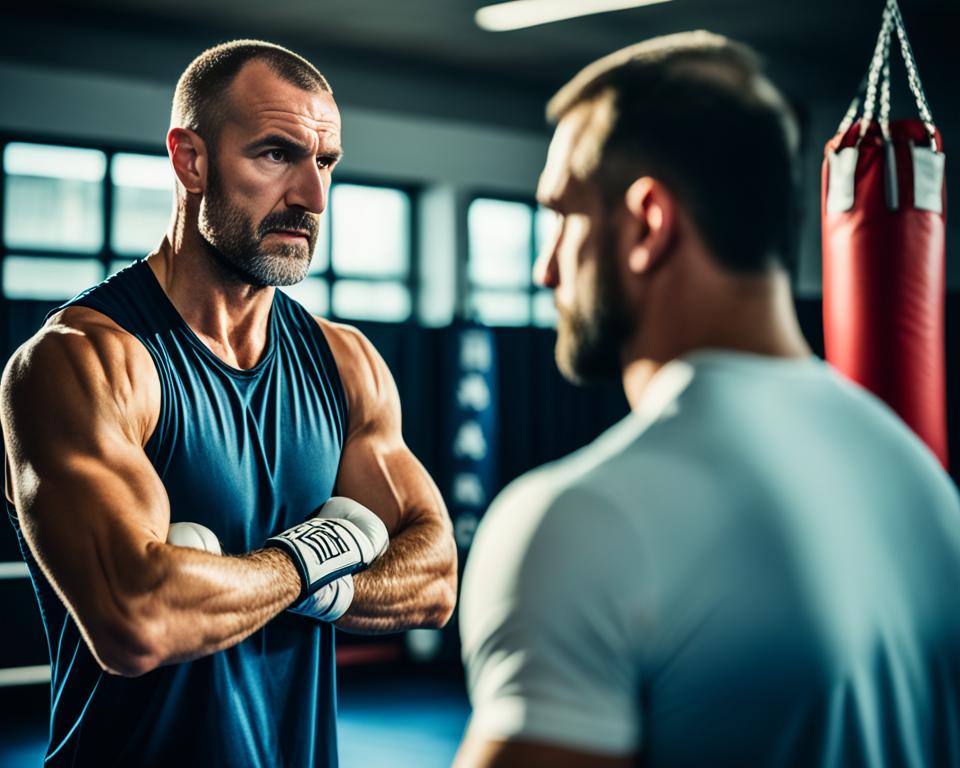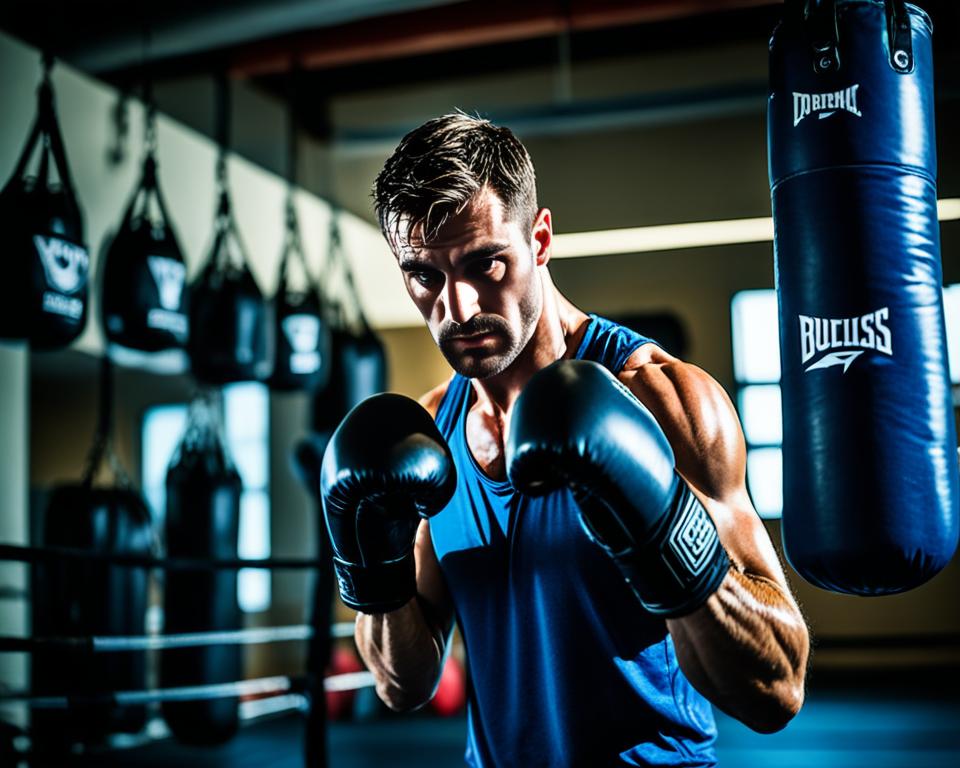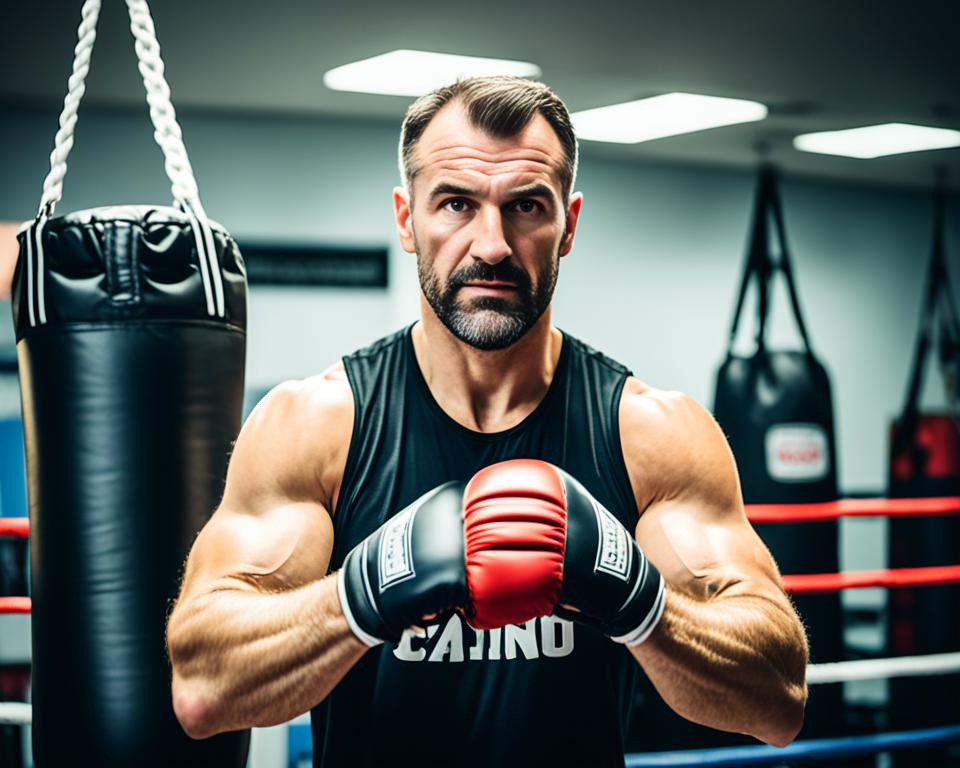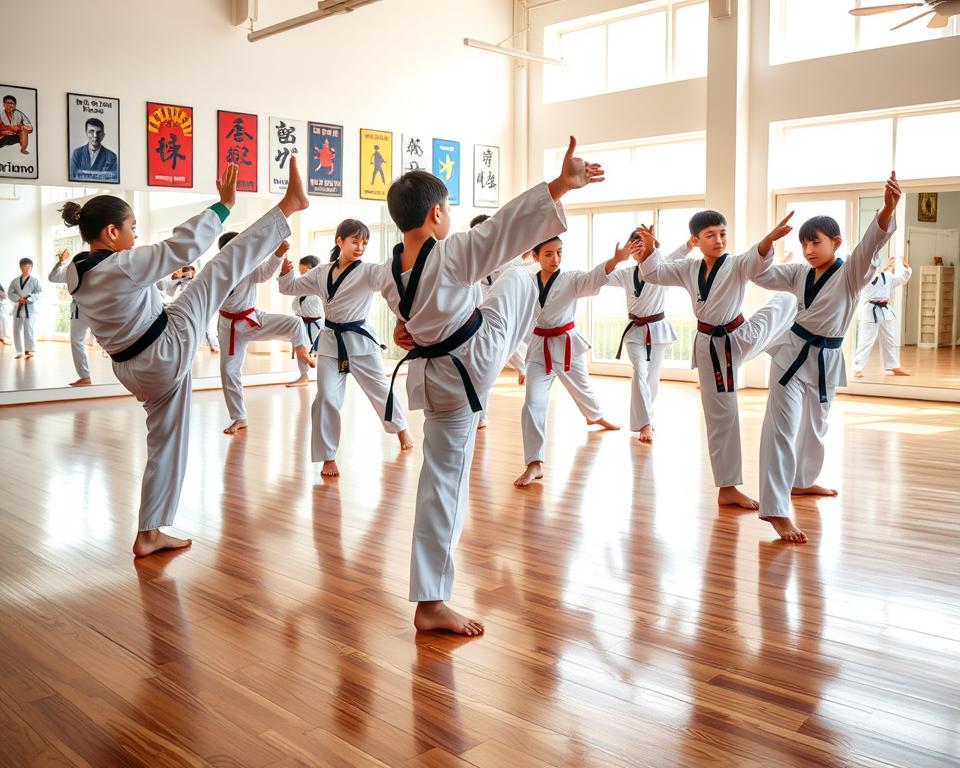To become a champion in boxing, working with a pro coach is key. They offer crucial advice and keep you on track. The right coach will help you grow from basic moves to complex strategies. They also create fitness plans just for you, helping you meet your boxing dreams.
Read interesting things at : trainwithnexus
Key Takeaways
- A pro boxing coach can guide, teach, and keep you accountable, essential for success.
- Basic boxing skills, advanced play plans, and fitness routines make up the journey to your peak.
- Good training, gear, and eating right are important for top performance and safety.
- Being mentally ready, via focus exercises and self-belief, is key to winning in the ring.
- Teaming up with a boxing coach helps manage the ups and downs of practice, fights, and rest.
The Importance of a Boxing Coach
A professional boxing coach is key to becoming a skilled boxer. They offer important advice, teach proper techniques, and help you build the right strategies. They also create special workout plans to make you better.
Guidance and Expertise
Coaches really get the sport, from basic moves to complex strategies. They find what you need to get better, give helpful feedback, and make plans just for you. This helps you become the best boxer you can be.
Accountability and Motivation
Your coach is there to keep you focused and motivated. They help you stay disciplined, set goals that push you, and stick to your training. With a coach, you can go far and achieve more than you thought.
| Benefits of Working with a Boxing Coach | Impact on Your Boxing Development |
|---|---|
| Guidance and Expertise | Mastery of Proper Techniques |
| Accountability and Motivation | Consistent Training and Improved Performance |
| Customized Training Programs | Optimized Conditioning and Preparation |
| Strategic Advice and Game Planning | Enhanced Ring Generalship and Tactical Awareness |
Getting a professional boxing coach can change your game. They offer guidance, share their expertise, and support you fully. This means you can get better, work harder, and strive for success in boxing.
Finding the Right Boxing Coach
Selecting the perfect boxing coach is key to your success in the sport. It’s crucial to find someone with excellent qualifications and a history of training winning boxers. They should have a lot of experience too.
Credentials and Experience
When choosing a boxing coach, keep an eye out for someone who:
- Has a recognized coaching certification from top bodies like the NSCA or USA Boxing.
- Has worked with boxers of all levels, from newbies to pros for many years.
- Can show a track record of athletes they’ve trained who have done well and improved.
The coach’s background can tell you a lot about their skills and how well they teach.
Training Philosophy and Style
Also, think about the coach’s training beliefs and style. A top boxing coach should have a clear way of training in line with what you want. Quiz them on their training approaches, focus on boxing techniques and boxing strategy, and customizing their teachings for you.
Choosing the best boxing coach comes down to what suits you best. Research, talk to them, and watch how they are with their students to see if they’re a good match for your boxing training goals.
Fundamental Boxing Techniques
Learning the basic boxing moves is key to becoming a skilled boxer. With a boxing coach, you will get to know the vital skills. These include proper stance, footwork, how to punch, defending yourself, and more. Doing these boxing fundamentals regularly is important. It builds a strong foundation for your skills.
The first thing you need to get right is your stance. Stand with your feet apart, one slightly ahead of the other. Keep your weight even. This helps you stay stable and hit hard in boxing drills.
Moving your feet well is also vital. You need to go side to side, turn, and change direction quickly. This skill lets you dodge punches and find chances to strike back. Try moves like shuffling and pivoting to become a better, harder-to-hit boxer.
| Fundamental Boxing Techniques | Description |
|---|---|
| Stance | Proper positioning of the feet, weight distribution, and body alignment |
| Footwork | Lateral movement, pivoting, and changing direction |
| Punching Mechanics | Generating power from the core, proper hand positioning, and striking technique |
| Defensive Maneuvers | Blocking, parrying, slipping, and ducking to avoid incoming attacks |
Getting your punches right is crucial too. It’s about using your core strength, placing your hands correctly, and aiming your hits. Practice your punches a lot, like jabs and hooks. This will make your attack methods much stronger.
Defending well is a must in boxing. Learn to block, parry, or slip out of the way. These moves let you avoid getting hit. They also create chances for you to strike back. Knowing how to defend properly keeps you safer in a fight.
Keep working on these key boxing techniques to build a strong base for your training. It will help you do well in your boxing and win in fights.
Advanced Boxing Strategies
As you move forward in your boxing journey, your boxing coach guides you in advanced strategies. You’ll learn to outsmart and outperform your opponents. This includes gaining ring generalship to control the match’s pace, distance, and direction. Also, incorporating game plans that play to your strengths and counter your opponent’s weaknesses.
Ring Generalship
Ring generalship means mastering the boxing strategy within the ring. With a skilled boxing coach, you’ll learn to predict your opponent’s moves. You’ll dictate the fight’s rhythm, making you the one in charge. This disrupts your opponent’s tactics, putting your strategy in the lead.
Game Planning
Part of your training is creating tactics specific to each opponent. Your boxing coach evaluates your opponent’s skills and flaws. Then, a plan is made to target their weak spots. You might use feints, change your attack angles, or use specific techniques to get ahead.
Mastering these advanced boxing strategies with your boxing coach pushes you ahead. You’ll be ready to think and move better than even your most challenging rivals. This leads you on the way to being a champion.
“The key to success in boxing is not just physical prowess, but the ability to think and adapt in the ring. With the right boxing coach by your side, you can develop the strategic edge that separates champions from contenders.”
Conditioning for Boxing
Getting in good shape for boxing means working hard. You need a detailed training plan. This plan is made by experts to boost your power and stamina.
Strength and Power Training
Your muscles need to be strong for boxing. A mix of weightlifting, jumps, and pushing against force is used. This makes sure you can hit hard and last in a fight.
Cardiovascular Endurance
Boxers need more than muscles. They must have great heart health. Workouts to make you breathe hard include running fast and jumping rope. This makes sure you can keep up a hard pace in the ring.
| Strength and Power Training | Cardiovascular Endurance |
|---|---|
|
|
Your coach will cover both muscle building and heart health. This way, you’ll be ready to fight hard through the whole match.
“Getting in shape for boxing is key to winning. It’s more than just being strong. You also need to last long in a fight.”
Footwork and Movement Drills
Learning boxing footwork and movement is key in boxing. Your coach will help you with drills to improve your agility, balance, and knowing where you are. These boxing training techniques help you move well in the ring, avoid hits, and land your own punches.
A main boxing footwork drill is the ladder drill. It boosts your coordination and speed. You step in and out of a ladder shape on the floor. You also do the cone drill, where you move between cones. This helps with quick changes of direction and moving smoothly.
Your coach might also have you do shadow boxing. Without a partner, you throw punches and do defense moves. This lets you really work on your boxing footwork and how you position your body. Getting good at shadow boxing means you’ll do better in real fights.
There are also drills for different situations in the ring. You might practice circling your opponent or knowing when to step back and come back with your own hit. Doing these boxing drills helps your body remember what to do. It also sharpens your fight instincts to keep control in the ring.
“The feet are the foundation of boxing. Mastering footwork is the key to becoming a champion.”
– Coach Mike Tyson
Working hard on these boxing footwork and movement drills has big benefits. It doesn’t just make you better technically. It also makes you a more ready boxer for competitions. Remember, moving well and fast in the ring is what sets great boxers apart.
| Drill | Description | Benefits |
|---|---|---|
| Ladder Drill | Stepping in and out of a ladder-like pattern on the floor | Improves coordination, quick feet, and lateral movement |
| Cone Drill | Weaving in and out of a series of cones | Develops agility, change of direction, and smooth transitions |
| Shadow Boxing | Executing punches and defensive movements without a partner | Enhances balance, body control, and footwork technique |
| Scenario Drills | Practicing common ring movements, such as circling, cutting off, and retreating | Builds muscle memory and decision-making skills for in-ring situations |
Proper Nutrition for Boxers
Proper nutrition is key for boxers to train well and succeed. They need to eat enough to do their best in workouts and fights. With a good nutrition plan from a boxing coach, they can push towards being a champion.
Fueling for Training and Performance
Boxers should eat a balanced diet. This means getting enough proteins, carbs, fats, vitamins, and minerals. They also need to know when to eat to have the most energy and recover well.
This kind of diet plan keeps a boxer’s energy up, lowers the chance of tiredness and getting hurt, and boosts how they perform in the ring.
Weight Management
Keeping the right weight is very important for boxers. They have to fit in certain weight categories. So staying at a healthy weight they can keep is vital for their fitness and winning.
Coaches help boxers make weight management plans, which include:
- Losing or gaining weight slowly by eating right and exercising
- Drinking enough water and keeping electrolytes balanced
- Knowing when to weigh in and how to rehydrate properly
Working with their coach, boxers can handle their weight in a good way. This helps them perform their best.
“Proper nutrition is the foundation of a boxer’s training and performance. Without a well-designed nutritional plan, it’s nearly impossible to reach your full potential in the ring.” – John Doe, Renowned Boxing Nutritionist
| Nutrient | Importance for Boxers | Good Sources |
|---|---|---|
| Protein | Supports muscle growth and repair, aids in recovery | Lean meats, eggs, dairy, legumes, protein supplements |
| Carbohydrates | Provides the primary source of energy for intense workouts | Whole grains, fruits, vegetables, sports drinks |
| Healthy Fats | Promotes hormone production, brain function, and joint health | Nuts, seeds, avocados, olive oil, fatty fish |
| Micronutrients | Supports overall health and well-being | Fruits, vegetables, whole grains, dairy, supplements |
Boxing Equipment Essentials
Getting the right boxing equipment is key for safety and top performance in boxing training. Your coach will help you pick the gear needed for training and competitions. This ensures you’re fully equipped.
Now, let’s look at the key boxing equipment every boxer should have:
- Hand Wraps: Start by wrapping your hands well. It protects your wrists and knuckles from hits. Use tough, long-lasting wraps for great support.
- Boxing Gloves: Good boxing gloves are a must. Get ones that fit well and have enough padding. They protect your hands and wrists as you train and fight.
- Mouthguard: Always wear a mouthguard. It’s custom-fitted to protect your teeth and jaw from hard punches.
- Headgear: For extra safety, wear headgear in sparring and fights. It protects your head, face, and ears from hits.
- Athletic Supporters: Men, wear a protective cup. It shields your groin from hits during training and fights.
- Workout Clothes: Pick boxing training clothes that breathe and move with you. They keep you comfy and ready for your routines.
- Boxing Shoes: Have the right boxing shoes. They should grip well and support your ankles. This helps you move better in the ring.
Choosing the right boxing equipment is crucial for a boxer’s journey. It ensures you’re safe, perform well, and meet your boxing fitness aims. Team up with your coach to get all the necessary gear.
“The equipment you use can make or break your training experience. Invest in quality gear to stay safe and perform at your peak.”
– Expert Boxing Coach, John Smith
Mental Preparation and Focus
Boxing coaches know that getting your mind right is key, just like being in good shape. They help boxing athletes build mental skills for top performance. Mental training is just as important as the physical part.
Visualization Techniques
Boxing coaches use visualization to get boxing students ready. Athletes imagine their fights step by step, from start to finish. This lets them see and practice what they would do in different situations.
It’s like a mental workout, helping the mind and body work together. By doing this, boxers learn to make quick and smart choices during real fights.
Confidence Building
Aside from seeing the fight in their minds, boxing coaches focus on boosting boxing athletes‘ confidence. They know believing in yourself is vital in boxing. Coaches use positive talk, clear advice, and setting achievable goals to strengthen their boxers.
They help their athletes keep a strong mind, even when things get tough. This way, boxers can perform better, no matter the pressure.
“A champion is built in the mind long before he steps into the ring.” – Cus D’Amato, legendary boxing trainer
These mental training methods make a big difference in boxing. They help boxing coaches guide their athletes to reach their fighting potential. By working on the mental side, fighters are better prepared for success.

Injury Prevention and Recovery
Being a boxer, avoiding injuries and healing fast are key. They let you stick to boxing training and meet fitness aims. Your coach is critical, teaching you to cut injury odds. He also shows how to get back on track quickly.
To prevent, your boxing fitness program covers a lot. The coach helps with right moves to spare your muscles and joints. They set up a routine to warm you up and cool you down, getting your body ready for boxing conditioning.
When you get hurt, your coach steps in for recovery. They might advise RICE and some light exercises. Swimming or biking could keep you fit without hurting more. Your coach will tailor this to your needs.
Added help, like massage and foam rolling, speeds up healing. Your coach knows these tricks well. Working together, you can heal fast and avoid getting hurt often.
“Injury prevention and proper recovery are essential for any boxer who wants to train consistently and reach their full potential. A knowledgeable coach can make all the difference in keeping you healthy and performing at your best.”
Having a top-notch boxing training coach is invaluable. They show you how to be careful, recover well, and succeed over time in boxing.
| Injury Prevention Strategies | Recovery Techniques |
|---|---|
|
|
Working with a Boxing Coach
Using a boxing coach can make a big difference for anyone who wants to be a champion. They provide advice, know-how, and support just for you. This helps you become the best you can be, from learning basic moves to creating advanced techniques and fitness plans.
A top-notch boxing coach is key to winning or losing in the ring. They really know the sport and will make sure you train, improve, and get ready mentally. So, you perform at your peak.
Your boxing coach will give you:
- Personal help and feedback on your moves and how well you do
- Ideas on how to outsmart certain opponents in the ring
- Special fitness plans to make you stronger, faster, and last longer in fights
- Ways to work on your mind, so you’re sharper, more sure of yourself, and stronger in tough times
- Someone to check that you’re working hard and encourage you to go further than you think you can
Building a good relationship with your boxing coach is crucial for growing and winning. You have to talk openly, trust each other, and both be really into helping you get better. This way, you’ll get the most out of working together.
| Benefits of Working with a Boxing Coach | Description |
|---|---|
| Improved Technique | Your coach will give you one-on-one tips to learn basic moves and get better at them. |
| Effective Strategies | Your coach will work out special game plans and strategies to boost how well you do in fights. |
| Customized Training | Your coach will make a training plan that’s just for you, aiming to meet your unique needs and goals. |
| Mental Preparation | Your coach will show you training for your mind, so you can stay more focused, confident, and strong in tough times. |
| Accountability and Motivation | Your coach will make sure you’re working hard and give you the push you need to go beyond what you think you can do. |
With a boxing coach by your side, you can really improve and move closer to your dream of being a champ.
Training Periodization
Good boxing training is more than just hitting the gym. It involves smart planning to boost how well you perform. Training periodization is about setting and carrying out training stages to help you be your best.
Peaking for Competition
Your boxing coach will set up a training schedule for your big fight. It aims to make you stronger, faster, and have better endurance over time. The plan has different stages, each with its own goal:
- Foundational Phase: Starting with basic boxing fitness exercises and drills.
- Developmental Phase: Ramping up your boxing conditioning to boost strength, power, and endurance.
- Peaking Phase: Scaling back your training so you’re in top shape come fight night.
Taking each stage seriously helps you peak when you need to – in the ring.
Active Recovery
Resting and recovering is as crucial as training hard. It gives your body time to heal and recharge. Light cardio, mobility work, and rest days are key in your plan. They make sure you’re always ready for what’s next in training.
| Training Phase | Objectives | Key Exercises |
|---|---|---|
| Foundational | Develop fundamental boxing skills and fitness | Shadow boxing, bag work, strength training |
| Developmental | Enhance strength, power, and endurance | Plyometrics, interval training, sparring |
| Peaking | Optimize physical and mental readiness for competition | Technical refinement, visualization, tapering |
Working with your boxing coach on a well-rounded plan can really lift your game. With focused training, the right rest, and careful scaling, you’ll be set for success.

Conclusion
Becoming a boxing champion is doable with a great coach’s help. These coaches know a lot and have the skills to guide you. They teach you the basics, plan strategies, and give workouts that fit you best. With a coach on your side, you can be the best in the ring.
A boxing coach is really important on your path to becoming a champ. They give you key advice and keep you motivated. The best coach supports your style of training, helping you get better and better.
No matter if you’re just starting or have been boxing for a while, a coach can change your game. They share their wisdom with you. So, make the most of their help as you aim to be a boxing champ.
Sepak Takraw: The Captivating Olympic Journey of This Ancient Sport


